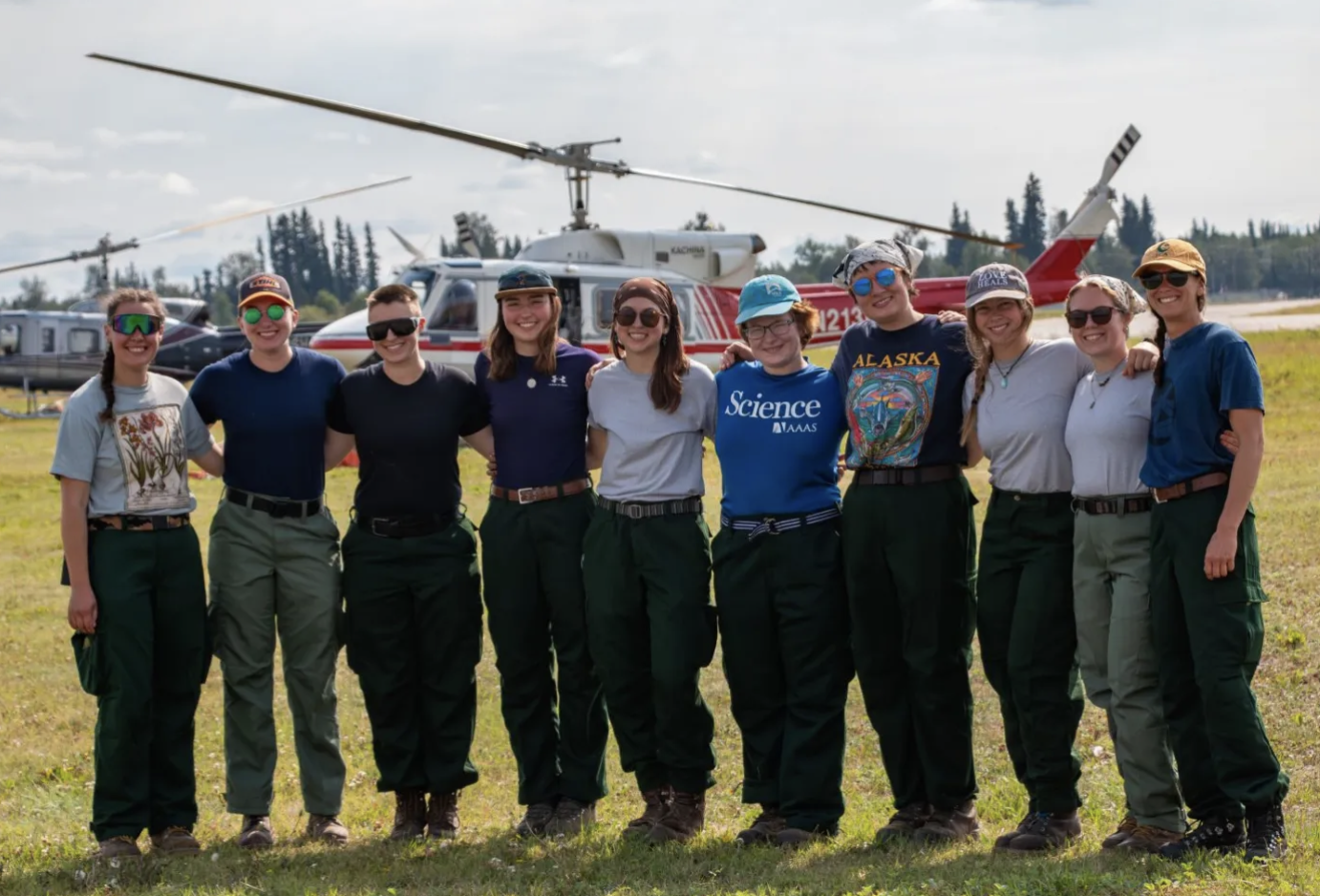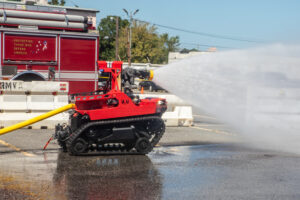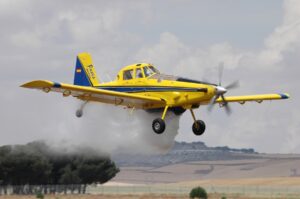
All-women’s group gets a taste of Alaska wildland firefighting
Hot and hungry from a morning of working outside in the Alaska summer heat, a group of 10 women firefighters sat for lunch and conversation. Pulaskis and chainsaws by their sides, the crew rested on the warm, blemished black of a recently burnt forest area in the hills of the Ikheenjik River – formerly known as Birch Creek – 70 miles northeast of Fairbanks. They listened intently as the crew boss addressed the group. The topic of conversation: Identifying issues encountered during their arduous morning labor of working with chainsaws.
Crew boss Thomas Partipillo spoke using fire language, asking if they were confident on the reliability of their day’s work to protect the remnants of a historic mining operation from a nearby wildfire. This was followed by a serious conversation about handling stressful situations, led by Incident Commander Karen Scholl, a fire specialist at BLM Alaska Fire Service (BLM AFS).
“Fire’s gonna do what it’s gonna do,” Scholl said. As someone who has worked in wildland firefighting since 1998, Scholl has learned to use fire behavior prediction information to plan and organize tactical operations to ensure the safety of firefighter personnel and the public – the number one priority in wildland firefighting.
The all-female group of 10 women from the Student Conservation Association (SCA), divided into two crews of five, arrived in Alaska at the beginning of summer 2023 to participate and gain experience in fire management efforts located within the state.

A nationwide program, the SCA is geared towards youth and young adults, with the aim to produce the next generation of conservation leaders through hands-on involvement in a wide array of service projects throughout the country. This SCA group was sponsored by the National Park Service (NPS) as part of an ongoing partnership between NPS and the SCA. It’s the second-year NPS has hosted the all-female SCA wildland firefighting group in Alaska.
After arriving in Alaska, BLM AFS and NPS Alaska staff provided training for the SCA group to become qualified wildland firefighters.
The SCA plays a vital role in encouraging women to explore unfamiliar opportunities in outdoors work. These particular crews provide an all-female setting that allows women to grow into the job in a more embracing environment. By offering all-female crew opportunities, they enable young women to be paired with knowledgeable female instructors, aware of their distinctly different needs and obstacles as they enlist in the prominently male field of wildland firefighting.

Top row, from left to right: Ruth Taygan, Emma Smith, Josie Schoeller, Rylee Armstrong, Anna Van Buren. Bottom row, from left to right: Emily Browne, Sophia Weisman-Rowell, Kelsey Wolf, Mindy Hawes, Kai Edwards.
Photo by Karen Scholl, BLM AFS
As a testament to the SCA’s wide scope, the 10 women sent to Alaska this summer is comprised of people from Ohio, Virginia, Michigan, Wyoming, Vermont, Wisconsin and Alaska.
Mindy Hawes and Sophia Weisman-Rowell, the two team leads, are in their first year of the SCA program. Hawes spent the previous three years on fuels reduction and trail work with the American Conservation Experience, as well as acting as assistant crew lead and working up to crew lead, before joining SCA as a project leader. She remarked that she “fell in love with working with trees, doing fuels reduction, and had always been curious about dipping into the fire world.”
Weisman-Rowell has an educational background in Forestry as well as prior experience with trail crews. It was the first year working in wildland fire for the two of them.
Multiple crewmembers have had prior involvement in conservation work. But for some, this was the first season they got to experience the industrious joys of long-term outdoors projects.
Jason Devcich, Fire Management Officer with NPS, coordinated with SCA to provide wildland fire training, logistics and fuels reduction projects on NPS lands in Alaska, and facilitated the crew’s initial connection with the BLM AFS. The group’s season began on May 15 and ended Aug. 18.
Five experienced female firefighters from BLM AFS, including Scholl, were selected as instructors and role models for the group. They imparted wisdom ranging from how to set up a water handling system with a pump and hose lay, to navigating some of the female-specific considerations on what to pack when heading out for a remote fire. The knowledge is generated from years of firefighting that include gender-specific experiences and knowledge their male counterparts lack.
BLM AFS Fire Specialist Kristy Hajny said it was inspiring to see the students’ enthusiasm and desire to learn to navigate the world of wildland firefighting.
“It was amazing seeing the quick progression of their skills, especially when it came to operating chainsaws,” Hajny said. The group of new firefighters struggled with starting chainsaws on the first day, but a day or two later were starting the saws while standing and safely felling trees.
“It was incredible just to see their confidence elevated within a few hours,” Hajny said.
In the following months, the group headed out to various projects across Alaska, starting with projects to reduce the fire hazard at Denali and Wrangell-St. Elias National Parks and Preserves, before ending up at BLM AFS on July 27 in preparation for their first fire assignment. The BLM AFS is responsible for suppression services on Department of the Interior and Alaska Native lands in Alaska including the 54 million acres managed by the Alaska National Parks. As one of the three protection agencies in Alaska, BLM AFS works in conjunction with the NPS to ensure fire suppression strategies and tactics are responsive to their land management goals, objectives and protection standards.
The group utilized these chainsaw skills to cut brush around a historic mining camp to protect it from the Ikheenjik Fire near the Birch Creek Wild and Scenic River northeast of Fairbanks. After this work was completed and fire activity moderated, they spent a few days in Fort Yukon waiting for their next fire assignment. The crew ended up on the Lost Horse Creek Fire north of Fairbanks to wrap up their fire season.
The two crew leads were asked about the importance of the all-female group and the impact SCA can have on hardworking women interested in a career in wildland firefighting.

“It was kind of intimidating, so this experience with the SCA in an all-women fire crew was the perfect introduction to fire for me,” Hawes said.
Speaking of the organization’s impact and the rewards of the crew’s hard work and training, Weisman-Rowell added “I’m very proud of (the group) and I think they can do whatever they want to, whether that be fire or not.”
The group’s time in Alaska represented an important step forward in their personal lives and professional careers. It provided growth in their collaboration, communication and leadership skills. Most importantly, this summer’s work set them up for a promising future in wildland firefighting careers.
~Story by Agustín Urioste, BLM AFS
SOURCE: https://akfireinfo.com/2023/11/17/all-womens-group-gets-a-taste-of-alaska-wildland-firefighting/


